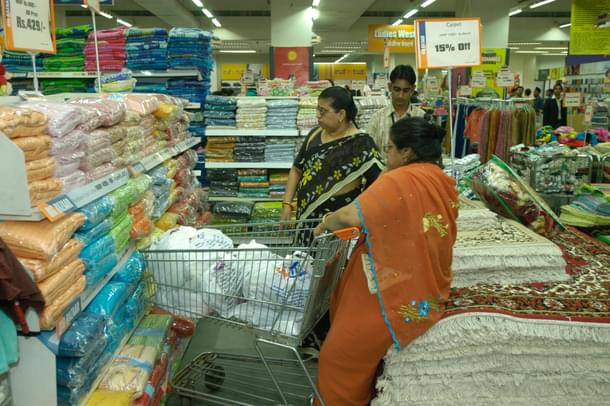Business
Distributors Vs Disruptors: Why All Is Not Well In The FMCG Space
Sourav Datta
Dec 06, 2021, 04:49 PM | Updated 04:49 PM IST
Save & read from anywhere!
Bookmark stories for easy access on any device or the Swarajya app.


Distributors of Fast Moving Consumer Goods (FMCG) companies are caught in a tussle with players such as Reliance, Udaan, Metro, Walmart and others.
The business-to-business (B2B) companies buy directly from manufacturers, and sell goods off to retail stores such as kiranas. As a result, traditional distributors have been struggling to keep up with the scale and the low prices offered by these platforms.
As a result, All India Consumer Products Distributors Federation (AICPDF) has threated FMCG companies with supply disruptions unless their voices are heard.
Distribution Is Being Disrupted
Larger players are well-funded, and, therefore, have larger operations across several regions. As a result of the high volumes of transactions, these companies can bargain for lower margins with FMCG companies.
According to distributors, these companies are burning cash and undercutting traditional supply chains to reach customers. As a result, traditional distributors are being pushed out of the business by the larger players.
Kirana stores account for almost 80 per cent of India’s retail market. Hence, reaching customers through these stores is a lucrative proposition for distributors such as Udaan and Jio.
Their B2B business model allows retail store owners to buy goods at much lower rates as compared to traditional distributors. The aspect of technology being — apps such as JioMart Partner App — makes procuring goods quite easy for kirana store owners.
While traditional distributors give margins of around 8 to 12 per cent to retailers, the new age player margins for retail could reach as high as 20 per cent.
With a lower scale of operations, and lower margins, it is difficult for traditional players to undercut the prices offered by these platforms. The JioMart Partner app offers several other conveniences such as 24-hour deliveries, credit facilities, and other value-added services.
Jio appears to be on the path to achieving Mukesh Ambani’s ambition of on-boarding 3 crore small retail stores on the Reliance network.
International Brokerages Remain Bullish On Reliance
International brokerages Goldman Sachs and Jefferies have been bullish on Reliance, especially as the retail business turns into a driver for growth. Jefferies believes that the B2B business is likely to become huge for Reliance by 2025 as the company builds a formidable network and offers better margins to retailers.
Goldman Sachs believes that Reliance’s direct retail business will see immense growth, as the business recovers, allowing it to capture 55 per cent of the entire retail market.
Currently, it controls 41 per cent of the FMCG market, up from 34 per cent a year ago. It expects that the partnerships with Facebook, Google, and other technology companies could help it achieve its goals.
The company has been on an acquisition spree, acquiring smaller companies operating in the retail space in order to strengthen its foothold on the sector.
Nevertheless, the Jefferies report also highlighted the concerns about a single distributor dominating the ecosystem. Hence, several players are expected to co-exist together.
In addition, Reliance might not have the cheapest options in all segments, according to the report. Therefore, traditional players might still have advantages in some areas.
FMCG Companies’ Mixed Reaction
In the past, some FMCG companies had stopped supplying goods to Udaan as distributors had complained about being under-cut by Udaan. But it appears that Reliance has not been subjected to such restrictions, possibly because it remains a valuable customer for FMCG.
Even before its B2B foray, Reliance was among the largest players in the retail business through its multi-format stores. Its acquisition of Future Group, and the online B2C business, JioMart, further cement Reliance’s position as an important customer.
The issue isn’t limited to just online B2B companies. Distributors have raised concerns about store wholesalers such as Metro Cash & Carry, and other stores, as well. These physical wholesalers benefit from their larger scale of operations, allowing them to compete against distributors.
Distributors’ Demands
FMCG distributors have put forward several demands to equalise the playfield. These include equal margins for all channels irrespective of volumes of business generated, product price parity, and several other demands. However, companies are yet to agree to these demands.
The distributors have said that if these demands are not met, these companies will not sell the stock-keeping units sold by the new B2B players.
Further, launches by companies would not be distributed by traditional distributors.
Despite the rapid growth of new-age distributors, the traditional distributors still remain an important part of the ecosystem, accounting for a major share of revenues. Though some FMCG companies have invested in owned supply chains, they are still reliant on traditional distributors. Hence, companies would have to balance the interests of both the parties.
Further, heavy dependence on a single distributor would mean lower margins for FMCG companies, making multiple distributors a necessity to maintain margins.
Nevertheless, investors continue to remain optimistic on new-age distributors with companies like Udaan and Reliance commanding high valuations in the private and public markets respectively.





